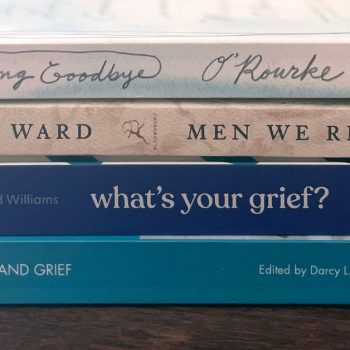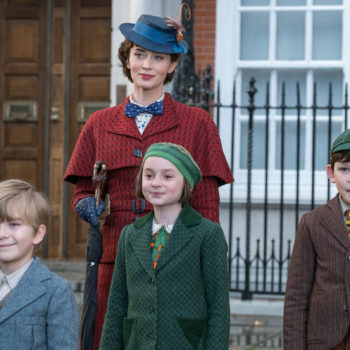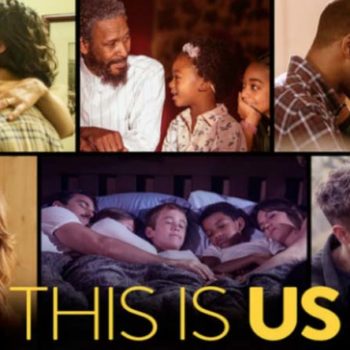12 Things Harry Potter Taught Me About Grief
/ Books, Movies, and Music : Litsa Williams
For further articles on these topics:
If you hang out here regularly, you may already know that Eleanor and I are both pretty big fans of Harry Potter. You were probably tipped off when we wrote our very own Harry Potter Grief Theory. That post required a bit of explaining for those who haven't read the Harry Potter books or seen the movies. Fortunately, talking about grief in Harry Potter doesn’t require much background (though if you haven’t read the books and plan to, there are some spoilers in this list so you should hurry up and read the books. Now. Seriously.) Death is a pretty significant theme throughout the series and there are lots of different messages about death and grief. JK Rowling, the book's author, lost her mother shortly after starting the books. So perhaps it is no surprise she weaves grief heavily into Harry’s story. I was 16 when Rowling published the first Harry Potter book in the U.S., not long before my dad died. Though I was a bit older than the target demographic, I read the first book the year after he died and was immediately hooked, in no small part because of the grief themes. All these years later, as a 30-something adult, these themes still stick with me. So, here they are:
Grief in Harry Potter: 12 Things Harry Potter Taught Me About Loss
1. Children grieve family members they can’t remember or never met.
Harry’s parents died when he was a baby before he was old enough to really remember them. Harry’s grief for his parents and his relationship with them is a theme throughout the entire series. It's evident that Harry experiences an ongoing sense of loss because he never had his parents in his life. Not having known his parents doesn't diminish his grief.
2. Relationships continue even after a person dies.
Harry’s relationship with his deceased parents continues throughout the series and this relationship is portrayed as normal and healthy. Harry learns about his parents through the memories of those who knew them and we see how his understanding of his parents changes as he learns about them and as he himself ages. I kinda doubt that JK Rowling was aware of the Continuing Bonds Grief Theory when she wrote the books. Nonetheless, Harry's ongoing and evolving relationship with his parent's memory, despite never having known them, perfectly embodies the ongoing connection many children maintain with deceased parents. This theme is reinforced later in the series with other loses Harry experiences, like Sirius and Dumbledore.
3. Maintaining a relationship with those who died can be wonderful and healthy, but it is important to also keep living.
In the very first book in the series, Harry Potter And The Sorcerer’s Stone, eleven-year-old Harry discovers a mirror that shows him his deepest desires. When Harry looks in the mirror, he sees his parents and other family members who died. After that, Harry becomes just a wee-bit obsessed and he visits the mirror regularly.
Thoughts on grief in Harry Potter? Leave a comment and subscribe!
We wrote a book!
After writing online articles for What’s Your Grief
for over a decade, we finally wrote a tangible,
real-life book!
What’s Your Grief? Lists to Help you Through Any Loss is for people experiencing any type of loss. This book discusses some of the most common grief experiences and breaks down psychological concepts to help you understand your thoughts and emotions. It also shares useful coping tools, and helps the reader reflect on their unique relationship with grief and loss.
You can find What’s Your Grief? Lists to Help you Through Any Loss wherever you buy books:






Kim November 30, 2019 at 11:35 pm
I wish there had been more time to explore more about sibling loss when Fred died. But it too is there. Even Petunia admitted Harry wasn’t the only one to lose a loved one that night. ❤️
Jared White November 12, 2018 at 10:30 pm
Excellent article! I’m going to share it in a Library Resource Guide I’m making about grief.
I did want to point out, though, that Hedwig didn’t come to Harry before he knew he was a wizard. Hadrid buys her for him in Diagon Alley. She is still his only friend during the times he has to be home with his horrible relatives and his only living connection to the Wizarding world during those times. In other words, she’s still incredibly important to him in many ways.
Marge Saenz September 12, 2018 at 11:09 am
Wow! Thank you! I am continually learning and searching for information and guidance in dealing with grief for myself and my grandsons who I have been raising since ‘07. Within a short span of 5 years, I lost my husband, my mom, my daughter (only child) and her husband, my son-in-law. It has been a difficult, agonizing,
inspirational and growing experience. However, my grief pales in comparison to the grief of a child, teenager or young adult. My main concern right now is for my 16 year old, who lost his dad when he was only 2 and his mom at 5. Big brother is 6 years older and continues to have serious issues related to his losses. In your piece, #1, #4 and especially #10, stood out loud and clear! We have, throughout these past eleven years, worked with professionals as a group and individually. Your piece has given me insight and encouragement.
Big brother is 6 years older, out on his own and is dealing with a mountain of unresolved issues related to his losses.
Christina Harkness August 9, 2018 at 9:06 am
A timely article as I just gifted the Harry Potter books to an 11 year old boy who just lost his mother. It was the first thing I thought of.
Kim Langley August 8, 2018 at 8:48 pm
This was very well thought out. You are born teachers! Thanks for your expertise.
Marty Tousley, RN, MS, FT, DCC July 11, 2017 at 11:11 am
A most impressive analysis! Well done! Thank you!
Gail Sharp July 6, 2017 at 4:10 pm
This article is spot on!! I connect with everything written here because my 17-year-old son died on January 28, 2013. I’m sharing this today!
Jean January 26, 2018 at 9:58 pm
Does it truly gets better?
runawaywidow.com February 1, 2017 at 10:17 pm
This is a great study. I like the connections.Good work.
Kathleen January 25, 2017 at 6:25 pm
Excellent…perfect. This is a good article to share with the non grievers in my life. Very relatable for everyone: readers, watchers, grievers, non grievers. Thank you.
Maria @ My Life as a Puddle January 18, 2017 at 1:07 pm
For anyone looking, thanks to your facebook page I discovered there is an entire book written on this subject – The Children Who Lived: Using Harry Potter and Other Fictional Characters to Help Grieving Children and Adolescents by Kathryn A. Markell and Marc A. Markell.
Lisa Friedrich January 18, 2017 at 9:19 am
I lost my soulmate Norm in 2013
sharon rainey January 17, 2017 at 10:28 am
on the mark – i love you guys. you get it.